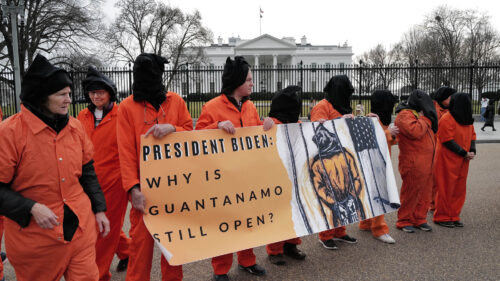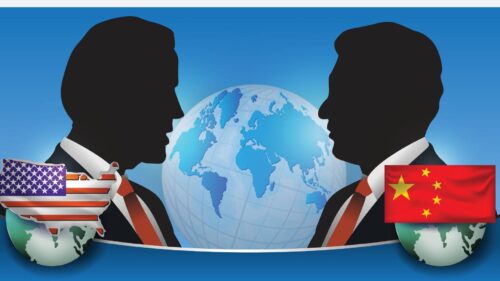In the aftermath of World War II, we crafted a fragile yet ambitious international order founded on principles of equality among states and a commitment to collective security. This rules-based international order aimed to transcend the chaos of earlier conflicts, promoting peace and cooperation through mutual respect and legal frameworks.
However, we now find ourselves at a critical juncture, facing what can only be described as a near-death experience for international law. Political expediency has eclipsed the very ideals that once united nations, creating a landscape where some states are evidently “more equal than others.”
The crisis of multipolarity
The geopolitical arena has undergone a seismic shift since the conclusion of the unipolar moment, a time when the United States reigned as the undisputed superpower. Today, we navigate a tripolar world characterised by the competing influences of three dominant powers: the United States, Russia and China. Each of these nations pursues its own interests, often at the expense of the established international legal framework, leading to a complex web of contradictions and conflicts that jeopardise the stability of global governance.
In this tripolar moment, the relationships among these power centres are far from straightforward. Russia and China, while pursuing divergent geopolitical ambitions, have found a common adversary in the US. This alliance of convenience complicates international relations significantly. China, increasingly recognized as a formidable global player, has tacitly supported Russia’s invasion of Ukraine, demonstrating a strategic partnership that serves both nations’ interests against what they perceive as Western hegemony.
Russia, still nursing the wounds of its Soviet past, is determined to reclaim its status as a great power. Its invasion of Ukraine, framed as a “special military operation,” seeks to reinstate a sphere of influence reminiscent of the days when it could challenge US authority on the global stage.
Meanwhile, the US persists as an entrenched power center, leading a coalition of Western nations that largely oppose Russia’s aggression, advocating for Ukraine’s sovereignty and providing substantial military and intelligence support.
Hypocrisy from the West
The West’s contrasting approaches to Ukraine and Palestine, however, illustrate a stark hypocrisy. While the US and its allies have rallied against Russia, they have simultaneously turned a blind eye to the plight of Palestinians. The ongoing humanitarian crisis in Gaza, marked by accusations of genocide against Israel, has not elicited a similar fervour from the West. Instead, the US continues to support Israel, often providing it with carte blanche to act with impunity in the face of international law.
This duality raises troubling questions about the foundations of international law itself. When the arrest warrant for Russian President Vladimir Putin was swiftly issued, the world observed a clear commitment to holding powerful leaders accountable for their actions. Conversely, efforts to hold Israeli Prime Minister Benjamin Netanyahu accountable for potential war crimes have met with staunch resistance from the US and other Western allies, revealing a stark inconsistency in the application of international norms.
Moreover, countries like Germany, Italy and the UK, which play a pivotal role in the European theatre, have been significant arms suppliers to Israel, further complicating the moral landscape of international law. Such actions not only undermine the credibility of these states but also diminish the sanctity of international legal frameworks designed to protect human rights.
At the heart of this crisis lies a profound erosion of legitimacy. The assertion that “my international law is better/more legitimate than yours” has become a dangerous mantra among the great powers, leading to an environment where legal principles are manipulated to serve national interests rather than uphold justice. This manipulation has created a dangerous precedent: When powerful nations selectively enforce international law, they undermine the very framework that holds the global community together.
How will the world move forward?
As conflicts in Ukraine and Palestine escalate, the prospects for resolution appear increasingly bleak. Both situations are emblematic of a broader trend in which the rights and voices of less powerful states and populations are consistently sidelined. The legitimate concerns of these states, often characterised by military and economic fragility, have been relegated to the periphery, exacerbating feelings of disenfranchisement and despair.
Compounding this precarious situation is the fact that all three power centres — Russia, China, and the US — are nuclear powers. This reality introduces an element of existential risk into the geopolitical calculus. The spectre of mutual assured destruction looms large, deterring overt military confrontation but simultaneously advancing a climate of instability. The fear of escalation creates a paradox: While the potential for nuclear conflict acts as a deterrent, it also perpetuates a precarious status quo that could fall at any moment.
In this context, the erosion of international law is not merely a legal concern; it poses a tangible threat to global peace. The moral compass that once underpinned the post-World War II order has been fragmented, leaving a void filled by militaristic posturing and geopolitical machinations. As nations increasingly resort to power politics and the barrel of a gun, the ideals of diplomacy and mutual respect risk being relegated to mere afterthoughts.
As we stand at this precipice, the urgency for a reinvigoration of international law and the principles that govern it has never been more pronounced. The global community must reassert its commitment to a rules-based order that prioritises justice, equality and accountability. This requires not only a re-evaluation of the existing power dynamics but also a concerted effort to elevate the voices of states and populations that have long been silenced.
Moreover, there is a pressing need for mechanisms that ensure the equitable application of international law, devoid of the selective enforcement that has characterised recent decades. Only through such reforms can we hope to restore faith in the international legal system and ensure that it serves as a genuine arbiter of justice rather than a tool for the powerful.
The near-death experience of international law invites reflection on our shared future. As we navigate the treacherous waters of a tripolar world, the stakes are undeniably high. The survival of the post-World War II order hangs in the balance, dependent on our ability to confront the complexities of contemporary geopolitics with integrity and resolve. We must strive to heal the fractures within our global governance structures, lest we find ourselves careening towards a regression that could lead us back to the Stone Age. In these dangerous times, the moral choices we make will shape not only our present but the legacy we leave for generations to come.
The views expressed in this article are the author’s own and do not necessarily reflect Fair Observer’s editorial policy.
Support Fair Observer
We rely on your support for our independence, diversity and quality.
For more than 10 years, Fair Observer has been free, fair and independent. No billionaire owns us, no advertisers control us. We are a reader-supported nonprofit. Unlike many other publications, we keep our content free for readers regardless of where they live or whether they can afford to pay. We have no paywalls and no ads.
In the post-truth era of fake news, echo chambers and filter bubbles, we publish a plurality of perspectives from around the world. Anyone can publish with us, but everyone goes through a rigorous editorial process. So, you get fact-checked, well-reasoned content instead of noise.
We publish 2,500+ voices from 90+ countries. We also conduct education and training programs
on subjects ranging from digital media and journalism to writing and critical thinking. This
doesn’t come cheap. Servers, editors, trainers and web developers cost
money.
Please consider supporting us on a regular basis as a recurring donor or a
sustaining member.
Will you support FO’s journalism?
We rely on your support for our independence, diversity and quality.










Comment